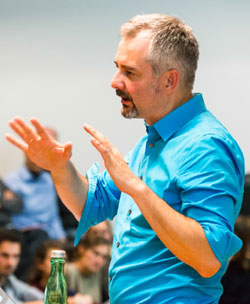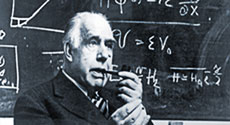Niels Bohr Lecture by Albert-László Barabási
Taming Complexity: Controlling Networks
Albert-László Barabási, Center of Complex Networks Research, Northeastern University and Division of Network Medicine, Harvard University.

Niels Bohr Lecture by Albert-László Barabási: Taming Complexity: Controlling Networks
Abstract: The ultimate proof of our understanding of biological or technological systems is reflected in our ability to control them. While control theory offers mathematical tools to steer engineered and natural systems towards a desired state, we lack a framework to control complex self-organized systems. Here we develop analytical tools to study the controllability of an arbitrary complex directed network, identifying the set of driver nodes whose time-dependent control can guide the system’s entire dynamics. We apply these tools to several real networks, finding that the number of driver nodes is determined mainly by the network’s degree distribution. We show that sparse inhomogeneous networks, which emerge in many real complex systems, are the most difficult to control, but dense and homogeneous networks can be controlled via a few driver nodes. Counter-intuitively, we find that in both model and real systems the driver nodes tend to avoid the hubs.
Wednesday, October 26, 2016 at 15:15 in Aud. 3 at HCØ.
About the speaker: Albert-László Barabási is both the Robert Gray Dodge Professor of Network Science and a Distinguished University Professor at Northeastern University, where he directs the Center for Complex Network Research, and holds appointments in the Departments of Physics and Computer Science, as well as in the Department of Medicine, Harvard Medical School and Brigham and Women Hospital, and is a member of the Center for Cancer Systems Biology at Dana Farber Cancer Institute. A Hungarian born native of Transylvania, Romania, he received his Masters in Theoretical Physics at the Eötvös University University in Budapest, Hungary and was awarded a Ph.D. three years later at Boston University. Barabási latest book is "Bursts: The Hidden Pattern Behind Everything We Do" (Dutton, 2010) available in five languages. He has also authored "Linked: The New Science of Networks" (Perseus, 2002), currently available in eleven languages, and is the co-editor of "The Structure and Dynamics of Networks" (Princeton, 2005). His work lead to the discovery of scale-free networks in 1999, and proposed the Barab‡si-Albert model to explain their widespread emergence in natural, technological and social systems, from the cellular telephone to the WWW or online communities.
Barabási is a Fellow of the American Physical Society. In 2005 he was awarded the FEBS Anniversary Prize for Systems Biology and in 2006 the John von Neumann Medal by the John von Neumann Computer Society from Hungary, for outstanding achievements in computer-related science and technology. In 2004 he was elected into the Hungarian Academy of Sciences and in 2007 into the Academia Europaea. He received the C&C Prize from the NEC C&C Foundation in 2008. In 2009 APS chose him Outstanding Referee and the US National Academies of Sciences awarded him the 2009 Cozzarelli Prize. In 2011 Barabási was awarded the Lagrange Prize-CRT Foundation for his contributions to complex systems, awarded Doctor Honoris Causa from Universidad PolitŽcnica de Madrid, became an elected Fellow in AAAS (Physics) and is an 2013 Fellow of the Massachusetts Academy of Sciences.
Northeastern University
- Robert Gray Dodge Professor of Network Science
- Distinguished University Professor
- Director, Center for Complex Network Research
Harvard University
- Lecturer in Medicine, Department of Medicine at both the Dana-Farber Cancer Institute and Brigham and Women's Hospital
Central European University
- Visiting Professor, Center for Network Science
|
Coffee and Cookies
Coffee, tea and cookies will be served outside the auditorium 15 minutes before the lecture.

 Niels Bohr Lectures
Niels Bohr Lectures